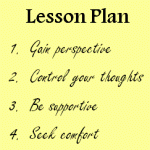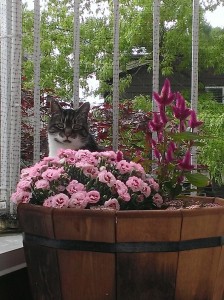Tag: taking a break
Recognizing when you need a break
I feel very fortunate to be working and enjoying my job right now, when so many people are unemployed or have limited opportunities to change roles. I also feel worn out from all the hours and energy I’ve put into both paid and volunteer work in the last couple of months. Although I have no right or desire to complain, I realize that I need to take a break before I start trudging through unproductive workdays or get so run down that I get sick.
Next week, I’m looking forward to a three-day weekend, when I will completely unplug from all work from Friday afternoon until Tuesday morning. This weekend, I practiced setting that boundary in a couple of ways. First, by letting others know I would fulfill my obligations during the workweek and second, by turning my attention back to the present whenever I started thinking about my work to-do list.
It wasn’t the most exciting weekend, but putting work out of my mind and focusing on what was in front of me made me extra appreciative of the great dinner I ate, the perfect temperature on my afternoon walk, and the fact that today was the first time in three weeks that I washed a load of laundry without a tissue hidden in a pants pocket.
Recovering from emotional fatigue
When we’re physically exhausted, a good night’s sleep is often enough to bounce back. Emotional fatigue can take a lot longer to recover from.
When we’re drained of energy by things like the shock of bad news, being overwhelmed by too much on our plates, or from slogging through a rough day at work, we often don’t feel better the next morning.
It took me many years to learn what helps me recover from this type of exhaustion. My best remedy is spending an entire day or more in a quiet, dark room. I’ll read a book or just rest. The important part is the sensory deprivation, which is my antidote for too much stimulation.
Of course, it’s often not possible to shut myself away from everyone and everything for 24 hours because even on a weekend there are people or things that need attention. When I can’t take a long break, I ask myself, “what is the most supportive thing I can do for myself right now?”
During a rough day last week, the answer was to take a 30-minute walk in the last bit of afternoon sunshine after I finished work. A month earlier, it was to take two hours to be alone in the middle of a weekend spent with others. Even though neither of these were my perfect solution, I felt significantly better in the moment and was back to my normal self within a couple of days. I found a way of starting to regain energy instead of continuing to add to my stress and exhaustion.
Part of why this method works is that I acknowledge how depleted I am and then assign the intention of supporting myself to whatever action I decide take. If last week I had just hung out on the couch, scrolling through my phone mindlessly for two hours, I would have distracted myself but not taken steps toward refilling my tank.
If you’re feeling drained, what is the best thing you can do for yourself right now?
Everybody needs a break once in a while

Everybody needs to take a break once in a while.
When we’re stressed and overwhelmed with work it can be challenging to take a few hours or a few days for ourselves. But spending a little time somewhere quiet, with a nice view, is a great way to slow down and regain perspective. In the grand scheme of things, having too many difficult projects with too-short deadlines is temporary. Life is bigger than our jobs.
When work and life are flowing smoothly, it is still important to take a break every now and then. Instead of using the time to recover, we can just…be. Breathe fresh air, watch a sunset, spend a few hours looking at geese making their way up and down a shoreline. It might spark creativity. It might just be a chance to shore up energy reserves that we’ll need to draw on later.
Do you need a break?
How to Avoid Losing Your Shit at Work
 Have you ever lost your temper at work and could not rein it in? You know, the kind resulting in a red-faced tantrum, a shout-down, or a crazed look in your eyes that made it seem like you might actually throw things?
Have you ever lost your temper at work and could not rein it in? You know, the kind resulting in a red-faced tantrum, a shout-down, or a crazed look in your eyes that made it seem like you might actually throw things?
If not, we probably haven’t met. And you make me nervous. You either have supremely fine-tuned skills in finding healthy ways to vent your anger or you have an internal build-up of rage that will shatter windows if it ever explodes.
Losing your cool at work sounds bad, but there are so many provocations that it is normal to feel that way sometimes. Provocations like jerky managers, coworkers, staff or customers. Or equipment that breaks when you really need to use it, or having to deal with the technology support department. Some companies call the IT support function the “help desk”. Employees often call it the “unhelpful desk”.
The last time I unleashed on someone at work, that someone was the third person I’d spoken with about a common computer issue – I needed my password reset. I had been off and on the phone for two hours trying to get this resolved. I got more and more upset as the last support person I spoke with gave me incorrect information, asked questions I’d already answered for him, and sounded like he was enjoying my frustration. I finally asked for the hours and locations where I could get help in-person. He said he didn’t know. And then asked if he could close the support ticket.
I don’t remember exactly what I said, but I do remember holding my phone in front of me as I yelled into it.
Stories of people losing their tempers tend to stick around and become humorous because we relate to them. My family has one that goes back to the days when my mom had a Baskin Robbins store. One day a young man came in asking for a sample of an ice cream flavor. As she handed him the little spoon, he tried to give it back and said “It’s not big enough.” If you’ve ever worked long food service shifts for years on end, you’ll understand that her reaction was: “Get out. Get OUT. GET OUT!”
I try to treat people with respect even when I’m flustered or when they are behaving poorly because that is part of my values. However, I’m flawed and sometimes exceed my capacity for containing my feelings. Fortunately I’ve learned from others and from my own mistakes and now have a set of tactics in place to deal with potential blow-ups before they happen.
The first and best action to take when you feel like you’re about to explode is to leave. As in, leave the workplace until you’ve calmed down or just go home for the rest of the day.
This didn’t occur to me as option until a time when I was debriefing with my then-manager after a horrible meeting. It was a stressful place to work on a good day and after this particular meeting I was very upset. My manager said if I couldn’t clear my head enough to get through the day without the risk of snapping at someone in our department, then I should go home. He wasn’t annoyed – he was as miserable as I was but was better at hiding it.
I was stunned. I had never left work unless I was sick or had an appointment. It took a while for the logic to sink in. And once it did, I got my things and left and no one else noticed or cared. I was back the next morning with a refreshed perspective and ability to cope.
If you are in a less flexible environment where you need permission from managers to leave, take some time to get composed before you speak with them. Take deep breaths, splash water on your face, walk around a bit…then tell them you don’t feel well and need to leave.
Important: saying “I don’t feel well” is not a lie. If you are frustrated to the point where you might scream at the next person that takes too long getting coffee in the kitchen, then clearly you don’t feel well. It is in everyone’s best interest for you to recognize that and remove yourself from the potential triggers.
If leaving the workplace is out of the question, then get to the most private place you can, as soon as you can and for as long as you can. For most people this is the restroom. Even the most uptight workplaces have to let their employees go to the bathroom once in a while.
Lock yourself in a stall. This time you might not want to take deep breaths (!) but there are other ways to calm down enough to return to work.
Getting upset creates tunnel vision.
Gaining clarity about what is happening to us can broaden our perspectives, and in turn, give us more capacity to make choices about our actions. One technique I practiced in Seattle University’s Emotional Intelligence class is to name the feeling. To keep it simple, we learned to make a fist and label each knuckle as one of four feelings: mad, glad, sad or afraid (pronounce it “afrahd” because rhyming makes it easy to remember and also it is more fun to say that way).
For example, you might think, “I am mad because Janet cancelled my trip to the conference. I am sad because I think Janet didn’t understand why the conference is important to me and my project. I am afraid my coworkers will think I’m less important because I’m the only person on the team who won’t be at the conference.”
While you are thinking each statement, tap the knuckle that corresponds to the feeling you’re describing. I don’t pretend to know the physiological reason for it, but adding the physical action while you are thinking about your emotions helps to focus your attention and let your words sink in. If you can fully BE with the thought and feeling of “I am afraid my coworkers will think I’m less important”, you acknowledge, validate and process what you are experiencing.
You will probably feel vulnerable – but only to yourself in the moment, and once you acknowledge how you honestly feel, the emotions will move through you more quickly. You are turning your attention away from thoughts that keep you in a mental tailspin, like “Janet is wrong, she’s a jerk, this job is stupid and nobody stands up for me” and are putting your focus on taking care of yourself.
If you stay with this technique until you’re grounded again – or at least until you have to leave the restroom – you will be much more capable of getting through the rest of the workday without losing your shit.
Cuz you left your shit in the bathroom.
Sorry! Couldn’t resist that one.
Remember, reaching the limits of containing anger and frustration at work is normal. Recognizing it and taking actions to protect your reputation and avoid lashing out is professional and mature.
And hey! Wash your hands.
Give Yourself a Break
If you’ve set goals or made plans and haven’t exactly followed through on them, give yourself a break. Beating yourself up isn’t going to deliver your achievement.
There are all kinds of reasons why progress slows down and sometimes comes to a stop. Maybe your immune system is lowered by the cold and flu season or because of extra stress in your life. Maybe you’re going through a challenge or transition and you have less energy than normal.
You could power through the fatigue and stress – for a while. Eventually your body will overrule your ambition and you’ll find yourself with less energy and strength than you had in the first place.
Instead of blaming yourself for not powering through your body’s requirement for rest, you could choose to accept it. It is only a temporary phase, after all. You could choose to acknowledge what is happening: “I am tired and have less energy. I need extra rest.” Then, you could allow yourself a break while you regain your strength.
This is not laziness. It is demonstrating self-awareness and self-value by placing your health among your highest priorities.
You may have created a deadline in your mind, or hoped for an achievement by a certain timeline. However, your body has its own reactions to your external environment, and its own ways of gauging what your mental, physical and emotional status is.
As a personal example, early this autumn I hired an editor to refine my manuscript. When she sent back her recommendations, I was excited and planned to finally finish my book within a month. Then my cat died, my business demanded extra attention and I had unexpected stressful events to deal with.
I wanted to work on my book. I’m so far past the time when I thought it would be published that I’m embarrassed when people ask me if it is available for purchase yet. Despite my wants and my ego, I decided to listen to my body when it told me I needed a break. I cut back on my obligations, slept a lot more, and stopped thinking about my book.
Two and a half months went by – not my ego’s timeline, but my body’s. Then I was ready to pick up my manuscript again.
As it turns out, putting it aside for a while made editing easier than in the past. I looked at my writing with a fresh perspective. I came up with a method of giving myself a small editing assignment each day that followed the same pattern. I keep a running list of each assignment on a piece of notebook paper and write “done” next to each task when I’m finished. Then I jot down the next assignment.
I wonder how much better my editing is now than if I had tried to force myself to do it when my mind and my energy weren’t ready?
I hope that you are full of good health and making progress in the areas of your life that make you happy. If not, maybe it is time for a break. A break without self-judgment or letting your ego make you feel disappointed. Maybe it is time for a healthy, restful break that you will emerge from better than ever.
You Don’t Need Permission to Rest
You don’t need permission to rest.
You don’t need permission from someone else to take a break. You don’t need to wait for your boss, your spouse or your friends to tell you that you are allowed to have some time to take care of yourself.
You don’t have to earn your right to rest. It is a human need. Remember that babies sleep a lot and nobody questions whether they deserve it.
Self-care is a buzzword lately, but what exactly does that mean? There is no self-care prescription, such as “soak in a bubble bath one hour before bed.” Maybe you hate baths or don’t even have a bathtub.
Only you know what will give you the rest and rejuvenation that you need. For some people that might be getting an extra hour or two of sleep each night for the next few months. For others, it could be taking walks every day. Different people might make a point to go to the gym, get acupuncture, spend more time with friends, or spend more time alone. If you don’t know what you need, start by asking yourself “What is the kindest thing I can do for myself today?”
If you’re overworked, burned out, sick, stressed or need a break from coworkers and family, take it. If other people are counting on your participation in certain activities, negotiate up front. Agree to deliver the presentation your manager wants by the end of the day, and then be clear that you won’t be online or checking mail for the next week while you’re out on vacation. Tell your friends you’ll meet them for dinner but need to leave the restaurant by 8PM. Participate and enjoy the people you’re with with you’re with them. Then leave the office or the dinner with friends when you’re tired.
If there are household chores to do, or extended family staying at your house for an extended period of time, agree upfront what will be done when, and by whom. Then let everyone know when you’ll be out of the house to go exercise, or that you need two hours of alone time to nap in your room.
Whatever it is that you need to shed stress and fatigue, do it. You don’t need permission to rest.
Hard Lessons
These are lessons I didn’t want to learn. If the tradeoff was having Milo with me or knowing what I know now? I’d pick my cat. Of course I would.
But life doesn’t work that way, so I figure that the only thing worse that losing him would be to not learn anything from it.
The first lesson came when my cat started showing symptoms that were later diagnosed as thyroid disease and lymphoma. I fell apart every day. Sometimes multiple times in a day. By falling apart I mean crying, and moments where my energy drained out of me and all I wanted to do was lay down.
Then I decided that I didn’t want to live like that anymore. With chemotherapy and his other medicines, it was possible that he would have lived for up to three more years and I didn’t want to be depressed that entire time. I made a choice not to make his illness the center of my life. I had a book to finish, relationships to care for and work to do. When he died, that choice became not making his death the center of my life.
The second lesson I learned is that I can control my thoughts. We hear a lot about this – the power of positive thinking, we create our own realities, blah blah. At different times in my life I have tried to consciously choose my thoughts but it wasn’t that effective. I also had some scorn about people trying to brainwash themselves into believing they were better off than they actually were. It seemed unauthentic.
Soon after Milo died, I felt a tremendous sense of guilt and regret. Not about euthanasia at the end. I regretted that I hadn’t rushed him to the ER sooner after he started going downhill the last time. He stopped eating and drinking and I waited, thinking about how stressful the hospital was and how much he hated it. I waited, wondering if would be better to let him die at home than put him through more intervention. I waited, asking myself how many times we were going to do this. Then the decision got past me, and by the time I took him to get fluids, it was a hospice mission.
After he was gone, I wished I could go back in time and make a different choice. I kept thinking, “if only I had taken him to the hospital sooner, would he still be alive?” These thoughts were so painful that I had to stop them. I realized that they didn’t serve me – they only caused me to suffer, and they didn’t honor Milo’s life. I made myself acknowledge that there is no way of knowing if he would have lived longer, and that thinking I made the wrong choices was just one story. Another story is that I did the right thing. Possibly more treatment would have been worse for him, or he might have died there, in the place he hated, away from me.
The “if only” thoughts still came, but when they did, I forcibly stopped them. As soon as I caught myself, I would think, “NO!” And then tell myself, “I choose to believe the possibility that I made the right choices.” At first this scenario played out repeatedly. After a while, less so.
The third lesson was that the support I received taught me how to support others in grief. One friend called me the evening that Milo passed away, and just listened. She invited me to go out the next night, and getting out and doing something helped. Another friend came to my house the next day with a plant, and the formalness of it made me feel like we were memorializing Milo. Receiving cards and reading messages from people on Facebook also helped.
In the past, I wasn’t always one to reach out when someone else experienced a loss. I might have been unsure if making contact was welcome. What if they wanted to be alone with their grief? Or I felt unsure of what to say and then didn’t reach out at all. After being comforted by other people’s gestures, I decided that even if I didn’t know what that person wanted, it is better to send an email, a text or make a phone call than not.
The last lesson I’ve learned is to look for support and comfort. Besides accepting help from my friends and family, I took action on my own. I read articles online about grieving animal companions, and found a weekly candle lighting ceremony at www.petloss.com. Each Monday, people across the globe gather online to read a prayer for our animals and light candles to honor them. When the ceremony isn’t taking place, people can use the chat room to seek support from each other.
A few days ago, a blog that I subscribe to included a post called Moving Beyond the Pain of Losing Someone You Love. The author, Karen Lang, wrote about the tragic loss of her son and how for a period of time she doubted the choices she made at the end of his life and was consumed with wondering “what if”. Although our losses are different, she expressed what I had been feeling and that was reassuring.
I also happened to get an email with a link to a podcast that featured Christina Rasmussen, who wrote a book called Second Firsts: Live, Laugh, and Love Again. Normally I have no patience for podcasts, but I listened to this one twice. She uses science to support her theories and talked about the importance of giving ourselves time to rest and recover when we’re hurt: she calls this “the waiting room”.
No matter what I have going on in my life, I feel self-imposed pressure to complete my self-imposed deadlines for work and writing. When I take breaks or try to get extra rest, I often wind up feeling more anxious instead of energized. Rasmussen’s message pointed out that allowing myself downtime is more helpful than slogging through my to-do list.
None of these lessons are worth what I lost. But they’re better than not learning anything at all.
Hike, Cry, Eat Pasta, Cry
I’m back from my three week tech break and feel like I was on another planet. I didn’t miss the web or social media at all. But re-entry into the regular world is disorienting.
While on my tech break, I went to Italy as part of a class I’d been taking on emotional intelligence. We stayed at an alpine village hotel in the Dolomites, where from morning to night we practiced identifying and owning our feelings, wants and stories about ourselves and other people, and then speaking those truths. Some of this was done at the hotel, and some while hiking on nearby mountain trails. When I described the class to people, I said we were going to talk about our feelings, cry, hike, cry, eat some pasta, cry. That was a fairly accurate prediction.
It was rough. And I’m used to this kind of thing – being direct, tapping into my emotions, trying to understand where other people are coming from. I’m a huge fan of the Nonviolent Communications movement and work to incorporate the NVC principles into my daily life.
But this was different. It was immersive, for one thing – over a week of focused practice and not a lot of time to process or reflect in between sessions.
We were all vulnerable and asked to be honest about our hurt feelings or anger, when in everyday life the pressures of social norms often have us disguise our emotions so as not to upset anyone. It was also triggering. Revealing uncomfortable feelings in the moment flipped open the lid where those same feelings had been hidden away in the past, when it didn’t feel safe to explore them. But when does it ever feel safe?
No doubt the experience was harder because my beloved cat has been so sick. We were in and out of kitty ER three times in the months leading up to trip, and I only felt comfortable leaving Milo because his new pet sitter is a vet tech who thought he was stable enough to hold on until I was home. There were some scary middle-of-the-night texts when he had to go back to the hospital, and a voicemail letting me know he’d been diagnosed with intestinal lymphoma.
It wasn’t all gloomy. There was great scenery, hikes, laughs and new friendships. There’s no better way to bond than sequestering 39 people in a small Italian village for a week of emotional plumbing.
Jet-lagged and sad, I didn’t do much besides sleep and laundry for the first few days back home. Re-entry into the land of the internet is taking some adjustment. I have two tendencies: connect and avoid. It’s so easy for me to go off the grid and enjoy my solitude, until suddenly I realize that I miss people. My last emotional intelligence class project is to seek a healthy middle ground.
Hike, cry, eat pasta, cry – it’s not such a bad class formula after all.
Taking a Break
Today is a milestone: I sent my manuscript off to an editor! After a year of starts and stops, this is a big step forward. Clink, let’s raise a glass to that understatement!
Of course once the editor sends it back in a few weeks, I will still have work to do. I will go through her recommendations, add, delete, rewrite and do another round of polishing.
But while the editor is working, it is best that I’m not. Otherwise we could get into a version control nightmare. I am happy to avoid that!
So what to do with three weeks? It would be prudent to use this time to write my book proposal. It’s a huge task, and one that I’ve been dreading. Or I could work on the twenty-minute talk I’m preparing to give to small groups, to start drumming up an audience of future readers and happy job quitters.
Should I?
Nah.
I’m going to take a break. I’ve been working nearly every single day, weekends included, on my consulting business, book, blog or all three and think my perspective is narrowing. I want to put all my work aside and shut off from technology as much as possible. PC closed, phone silenced, tv off. Well, the tv is a gimme since I rarely watch it anyway.
This is my chance to turn off the usual noise my head and see what else I might like to think or feel or deal with.
Since early August, I’ve been taking a class that focuses on interpersonal awareness and managing relationships. It is turning out to be heavier than I anticipated. Not that I was expecting a class on these topics to be lighthearted fun, but c’mon, I’ve participated in so many of these types of workshop already! I went into it thinking this class would be remedial, a piece of cake. More like humble pie!
Sigh. I guess there’s always more to learn and process.
So this is a great time to take a tech break. I’ll focus on getting as much as possible from my class. I’ll spend more time outside, read and try to relax.
I’ll be back with a new post mid-September, and hopefully with a clearer head, a fresh perspective, a tightly edited manuscript, and much to report back on. See you then!







Recent Comments